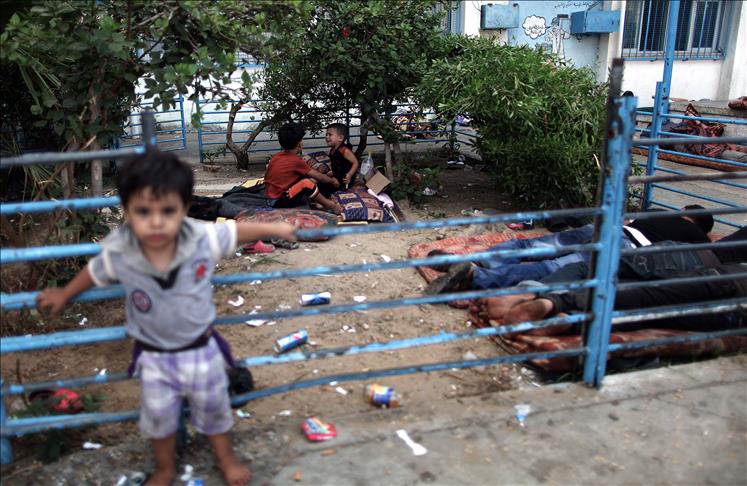
GAZA CITY
Nine-year-old Alaa Haggag kept imploring her mother for hours to buy her new clothes for the minor Islamic feast (Eid al-Fitr), which has started in Gaza as well as in some other parts of the Islamic world on Monday and will last until Wednesday.
The mother looked at the child, and then around her all across the refugee site she and the rest of her family members had been forced to escape to because of Israel's ferocious shelling of the Gaza Strip, but could do nothing to appease the child who started crying at this point.
"She cries a lot and wants me to buy her new clothes for the feast," Hala Haggag, Alaa's 27-year-old mother, told Anadolu Agency. "But I really cannot do anything about it," she added.
As Muslims celebrate the minor feast, which comes with the end of the holy fasting month of Ramadan, this year, Muslims in the Gaza Strip receive the occasion in a very special mood.
The feast this year comes while the Palestinian enclave still reels under an Israeli aggression that has left more than a thousand Gazans dead and thousands of others injured. It also turned hundreds of homes into mere rubble and partially destroyed thousands of other homes.
Thousands of Gaza families are also left without the necessary financial means to lead a dignified life. Having left their homes and work behind and turned to refugee camps, United Nations schools, mosques or churches to seek safety, these families are the least capable of buying the needs of their children.
Alaa's family, which used to live in the eastern Gaza City Shujaya residential neighborhood, had to seek shelter here at a United Nations Relief and Works Agency for Palestinian Refugees (UNRWA) school. The family could not, however, buy the children new clothes for the feast under tight economic conditions and a somber psychological mood, while death manifests itself in every aspect of the place: on the streets, on building walls and in the skies.
"We could only get the clothes on our skin when we got out of our homes," Hala said. "We don't have any source of income to buy anything," she added.
Sense of loss
Life in a shelter like this one is like nothing in normal conditions. Apart from estrangement and the feeling of loss that makes the times of the people who live in these shelters away from home, they also have to stick to the basics only, while most of the requirements for life are totally absent.
Hala had given birth to a child only five days ago. The little child has come to a world full of death, blood, and gloom. The woman had hoped to buy new clothes for the child.
"I can't even find a safe place where I can put her," Hala said. "This isn't a place where a five-year-old can live," she added.
Hala's family had lost six members a few days ago when Israeli planes struck their home during a raid on the residential Shujaya neighborhood. Scores of other people were killed in the neighborhood in what was described by the Palestinian Health Ministry as the most bloody day in the Israeli war on Gaza, which started on July 7.
Other family members wait on tenter-hooks for the war to come to an end so that they can lead a normal life. Despite the losses these people had sustained because of the Israeli war, they are still ready to start a new life and brush their sadness and black memories aside.
Even with this, they have determination to continue living and achieve victory in a war they describe as a "fait accompli".
"We will celebrate the feast when we achieve victory in this war," Kawkab Haggag, 40, said. "As for now, there can't be joy while the blood of our children still demonstrates itself everywhere here," she added.
Victory seems, however, to be so away in Gaza's case. Ten children were killed on Monday by an Israeli strike on a western Gaza City park, which raises Gaza's total death toll from Israel's ongoing war on the strip to 1055.
The self-proclaimed Jewish state has started its offensive – codenamed "Protective Edge" with the stated aim of undermining the ability of Gaza-based resistance movements to launch rocket attacks against it.
A growing civilian toll, however, casts doubts on Israeli intentions and puts ordinary Gazans like Hala, her daughter Alaa and relative Kawkab in deep uncertainty.
Alaa stood at the door of the UNRWA school and looked at other children celebrating the feast outside, but her eyes were full of questions about when Gaza's current adversity would come to an end.
By Nour Abu Aisha
Anadolu Agency website contains only a portion of the news stories offered to subscribers in the AA News Broadcasting System (HAS), and in summarized form. Please contact us for subscription options.

